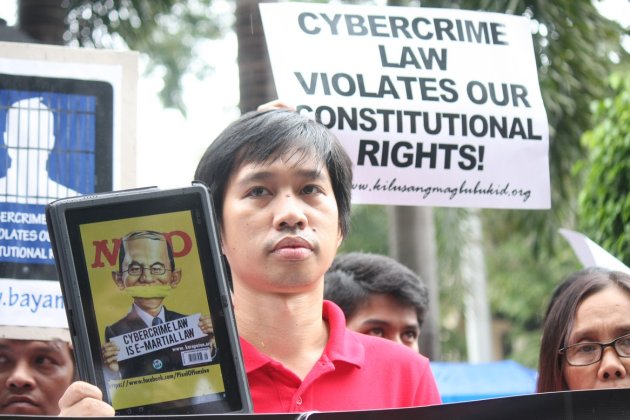
A protester displays a placard and wears a tape over his mouth during a rally against the new Anti-Cybercrime Law by the Aquino government, at the Supreme Court in Manila, on 02 October 2012. The Supreme Court
Senators who voted for the passage of the Cybercrime Prevention Act now seem to be skating around the issue as the law continues to draw the ire of Filipinos and the attention of the international community.
One by one, lawmakers have vowed to file bills to amend the newly approved law, particularly to repeal its provisions on online libel, which they say “slipped under their noses.”
“I do not suggest that we ‘throw the baby out with the bath water,’ but the libel clause must be amended and free speech upheld,” Sen. Ferdinand “Bongbong” Marcos, Jr. said in a statement on his official Facebook account Wednesday.
“I will file a bill to that effect and support all efforts made in the same direction,” he added.
His statement comes amid several petitions filed by various groups urging the Supreme Court to block the implementation of the law which takes effect Wednesday.
The Cybercrime Prevention Act also grabbed the global spotlight, with international watchdog Human Rights Watch saying that it violates free speech and a Forbes article calling it “a mix of ignorance to technology.”
Like Marcos, Sen. Francis “Chiz” Escudero said he is set to file amendments to the law.
The addition of online libel “was a mistake,” he said, although declining to provide any reason or motive as to its inclusion.
“I will just admit our shortcomings, personally, because I can’t speak for other senators,” Escudero added.
For his part, Marcos noted that the committee report he signed included no libel provisions.
“The records will show that when the Libel Clause was introduced and approved on the same day, I was away on ‘official business,’” he said.
Also saying that she will file an amendment is Sen. Pia Cayetano, who admitted that no one blocked the libel provisions when they were brought to the floor.
“It was impeachment period, when Cybercrime Bill was called, I reviewed portion on child porn, which is my area of responsibility,” Cayetano said via her Twitter account Tuesday.
She added that she would have blocked the libel provision if she “had seen seen it or if someone pointed it out.”
“Sadly we cannot catch every provision all the time,” she tweeted.
Even the law’s author, Sen. Edgardo Angara, said he will move to amend the new law when Congress resumes Oct. 8.
He particularly cited provisions granting the Department of Justice (DOJ) powers to restrict and block access computer data based on prima facie evidence, reports said.
Angara also asked DOJ to suspend the implementation provisions in question.
Aside from Cayetano, Escudero and Marcos all voted to pass the Cybercrime Law, 10 other senators voted in favor of the bill.
These were Senators Joseph “Jinggoy” Estrada, Gregorio “Gringo” Honasan, Panfilo “Ping” Lacson, Manuel “Lito” Lapid, Loren Legarda, Aquilino “Koko” Pimentel, Ramon “Bong” Revilla, Vicente “Tito” Sotto, Ralph Recto and Manny Villar.
Only Sen. Teofisto “TG” Guingona III voted against the bill, claiming it to be “oppresive and dangerous.”
Guingona last month also asked the High Court to void certain provisions in the bill, including libel.
“Let me clarify this to avoid confusion, the country needs a Cybercrime Prevention Act, however, this law that was passed recently contains problematic provisions,” Guingona said in an earlierstatement.
“Without these confusing and vague provisions, this law is necessary,” he added.
Marcos, however, noted: “This is no time to make excuses nor to blame anyone for what I cannot agree to with regards the libel clause.”
“Having said that, I would rather be accused of a lapse in supervision than not do anything to correct it,” Marcos said.

0 comments:
Post a Comment